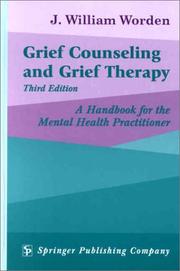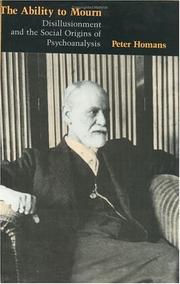| Listing 1 - 10 of 19 | << page >> |
Sort by
|
Book
Year: 1991 Publisher: Deventer : Kluwer,
Abstract | Keywords | Export | Availability | Bookmark
 Loading...
Loading...Choose an application
- Reference Manager
- EndNote
- RefWorks (Direct export to RefWorks)
Grievance procedures --- Grievance procedures --- Industrial relations --- Labor disputes --- Griefs (Relations industrielles) --- Griefs (Relations industrielles) --- Relations industrielles --- Travail --- Conflits
Book
ISBN: 0875896235 Year: 1984 Publisher: San Francisco : Jossey-Bass,
Abstract | Keywords | Export | Availability | Bookmark
 Loading...
Loading...Choose an application
- Reference Manager
- EndNote
- RefWorks (Direct export to RefWorks)
Collective bargaining --- Grievance procedures --- Universities and colleges --- Teacher-administrator relationships --- Griefs (Relations industrielles) --- Universités --- Relations enseignants-administrateurs --- College teachers --- Administration --- Teacher-Administrator relationships --- Administration. --- Universités

ISBN: 0826141625 9780826141620 Year: 2002 Publisher: New York (N.Y.): Springer,
Abstract | Keywords | Export | Availability | Bookmark
 Loading...
Loading...Choose an application
- Reference Manager
- EndNote
- RefWorks (Direct export to RefWorks)
Grief therapy --- Mental health counseling --- Counseling --- Grief. --- Psychotherapy --- Mourning --- Griefs --- Mournings --- Bereavement --- methods. --- Grief --- Counseling, Mental health --- Health counseling --- Mental health services --- Grief counseling --- methods

ISBN: 0801433053 Year: 1997 Publisher: Ithaca : Cornell University Press,
Abstract | Keywords | Export | Availability | Bookmark
 Loading...
Loading...Choose an application
- Reference Manager
- EndNote
- RefWorks (Direct export to RefWorks)
Multi
ISBN: 9782807211094 Year: 2023 Publisher: Limal Anthemis
Abstract | Keywords | Export | Availability | Bookmark
 Loading...
Loading...Choose an application
- Reference Manager
- EndNote
- RefWorks (Direct export to RefWorks)
Depuis le 1er octobre 2020, toute personne détenue dans une prison belge peut introduire une plainte formelle contre les décisions prises à son encontre par le directeur de l'établissement pénitentiaire où elle réside. Ces plaintes sont traitées par des commissions de plaintes instituées dans chaque établissement et, le cas échéant, en degré d'appel, par l'une des deux commissions d'appel, francophone ou néerlandophone, instituées au sein du Conseil central de surveillance pénitentiaire. L'instauration de ces nouvelles voies de recours a représenté une véritable petite révolution pour le contentieux pénitentiaire. Après un peu plus de deux ans d'application, il paraît utile d'en tirer les premiers enseignements, que ce soit au niveau des procédures applicables ou des grandes thématiques qui ont été traitées jusqu'ici. Tel est le double objet de cette publication consacrée au droit de plainte et au contentieux administratif pénitentiaire.
Criminology. Victimology --- Administrative law --- gevangenen --- gevangeniswezen --- Belgium --- Administrative remedies --- Administrative procedure --- Grievance procedures for prisoners --- Prisoners --- Recours administratifs --- Procédure administrative --- Griefs des prisonniers --- Prisonniers --- Civil rights --- Droits --- Procédure administrative --- Doléances --- Contentieux administratif. --- Prisons --- Contrôle juridictionnel de l'administration --- Statut juridique --- Droit. --- Doléances --- Contrôle juridictionnel de l'administration
Periodical
Year: 2001 Publisher: Ottawa : Le Comité,
Abstract | Keywords | Export | Availability | Bookmark
 Loading...
Loading...Choose an application
- Reference Manager
- EndNote
- RefWorks (Direct export to RefWorks)
Grievance procedures --- Griefs (Relations industrielles) --- Royal Canadian Mounted Police External Review Committee --- Royal Canadian Mounted Police --- Comité externe d'examen de la Gendarmerie royale du Canada --- Gendarmerie royale du Canada --- Royal Canadian Mounted Police. --- Royal Canadian Mounted Police External Review Committee. --- Comité externe d'examen de la Gendarmerie royale du Canada. --- Gendarmerie royale du Canada. --- Discipline --- Discipline --- Canada.

ISBN: 0415040159 Year: 1992 Publisher: London Routledge
Abstract | Keywords | Export | Availability | Bookmark
 Loading...
Loading...Choose an application
- Reference Manager
- EndNote
- RefWorks (Direct export to RefWorks)
Although most areas of human experience are nowadays discussed freely and openly, the subject of death is still surrounded by conventional attitudes and reticence that offer only fragile comfort because they evade the real issues. The dying may thus be denied the opportunity of sharing their feelings and discussing their needs with family, friends, or hospital staff. Although receiving devoted medical care, a dying patient is often socially isolated and avoided, since professional staff and students can find contact painful and embarrasing. Aware of the strains imposed on all sides by this situation, Dr Kubler-Ross established a seminar at the University of Chicago to consider the implications of terminal illness for patients and for those involved in their care. Patients invited to talk about their experience often found great relief in expressing their fear and anger and were able to move towards a state of acceptance and peace.The seminar, initially composed of students of medicine, sociology, psychology, and theology, but later joined by hospital staff and relatives of patients, enabled many members to come to terms with their own feelings and to respond constructi to what the patients had to teach them.
Death --- Bereavement --- Attitude to Death. --- Grief. --- terminaal zieke (terminale patiënt) --- getuigenissen --- dood --- stervensbegeleiding --- levenseinde (einde van het leven, levenseindebeslissing) --- recht op waardig sterven --- stervensproces (sterven) --- Terminal Care --- Mourning --- Griefs --- Mournings --- Attitudes to Death --- Death, Attitude to --- Death, Attitudes to --- Psychological aspects. --- malade terminal (patient terminal) --- témoignages --- mort --- accompagnement de personnes proches de la mort --- fin de vie (décision de fin de vie) --- droit de mourir dans la dignité --- mourir --- psychology. --- Psychological aspects --- Psychology --- Sociology of health --- Attitude to Death --- Grief --- psychology
Book
ISBN: 9781409444169 1409444163 Year: 2013 Publisher: Farnham Ashgate
Abstract | Keywords | Export | Availability | Bookmark
 Loading...
Loading...Choose an application
- Reference Manager
- EndNote
- RefWorks (Direct export to RefWorks)
Examining the compelling and often poignant connection between women and the material culture of death, this collection focuses on the objects women make, the images they keep, the practices they use or are responsible for, and the places they inhabit and construct through ritual and custom. Womens material practices, ranging from wearing mourning jewelry to dressing the dead, stitching memorial samplers to constructing skull boxes, collecting funeral programs to collecting and studying diseased hearts, making and collecting taxidermies, and making sculptures honoring the death, are explored in this collection as well as womens affective responses and sentimental labor that mark their expected and unexpected participation in the social practices surrounding death and the dead. The largely invisible work involved in commemorating and constructing narratives and memorials about the dead-from family members and friends to national figures-calls attention to the role women as memory keepers for families, local communities, and the nation. Women have tended to work collaboratively, making, collecting, and sharing objects that conveyed sentiments about the deceased, whether human or animal, as well as the identity of mourners. Death is about loss, and many of the mourning practices that women have traditionally and are currently engaged in are about dealing with private grief and public loss as well as working to mitigate the more general anxiety that death engenders about the impermanence of life.
History of civilization --- women [female humans] --- Death --- Memorialization. --- Women and death --- Mort --- Commémorations --- Femmes et mort --- Social aspects. --- Aspect social --- Women and death. --- Grief. --- Women --- Attitude to Death. --- Funeral Rites. --- 7.01 --- 7.049 --- Gender Studies --- Kunsttheorie ; over de dood ; het rouwen ; rouw --- Grafmonumenten ; graftombes ; van of door vrouwen --- Sterven ; dood ; socio-culturele aspecten --- Mortuary Customs --- Custom, Mortuary --- Customs, Mortuary --- Funeral Rite --- Mortuary Custom --- Rite, Funeral --- Rites, Funeral --- Attitudes to Death --- Death, Attitude to --- Death, Attitudes to --- Mourning --- Griefs --- Mournings --- Bereavement --- Death and women --- Memorialisation --- Memorials --- psychology. --- Kunst ; theorie, filosofie, esthetica --- Iconografie ; verschillende onderwerpen --- Commémorations --- Memorialization --- Grief --- Attitude to Death --- Funeral Rites --- Social aspects --- psychology --- dood --- cultuurgeschiedenis --- vrouwengeschiedenis
Book
ISBN: 1784504580 9781784504588 9781785927386 1785927388 Year: 2017 Publisher: London Philadelphia
Abstract | Keywords | Export | Availability | Bookmark
 Loading...
Loading...Choose an application
- Reference Manager
- EndNote
- RefWorks (Direct export to RefWorks)
With 15 ready-to-use protocols, this book explains the theory and practice of art therapy approaches to grief and features client case studies and art therapists' own experiences. Methods, procedures and a discussion of themes are organised in an instructional manner for ease of replication in a wide variety of clinical settings.
Grief therapy. --- Attachment behavior. --- Arts --- Art Therapy --- Mindfulness --- Behavior Therapy --- Grief. --- Object Attachment. --- Bonding, Psychological --- Object Relationship --- Psychological Bonding --- Bonding (Psychology) --- Bonds, Emotional --- Emotional Bonds --- Object Relations --- Symbiotic Relations (Psychology) --- Attachment, Object --- Attachments, Object --- Bond, Emotional --- Bondings (Psychology) --- Emotional Bond --- Object Attachments --- Object Relation --- Object Relationships --- Relation, Object --- Relation, Symbiotic (Psychology) --- Relations, Object --- Relations, Symbiotic (Psychology) --- Relationship, Object --- Relationships, Object --- Symbiotic Relation (Psychology) --- Mourning --- Griefs --- Mournings --- Bereavement --- Arts therapy --- Creative arts therapy --- Expressive arts therapy --- Behavior, Attachment --- Developmental psychology --- Love --- Transitional objects (Psychology) --- Grief counseling --- Psychotherapy --- Therapeutic use. --- methods. --- Grief --- HEALTH & FITNESS --- MEDICAL --- Diseases --- General. --- Clinical Medicine. --- Diseases. --- Evidence-Based Medicine. --- Internal Medicine. --- Sorrow --- Emotions --- Loss (Psychology)

ISBN: 0226351114 Year: 1989 Publisher: Chicago University of Chicago press
Abstract | Keywords | Export | Availability | Bookmark
 Loading...
Loading...Choose an application
- Reference Manager
- EndNote
- RefWorks (Direct export to RefWorks)
Cross-Cultural Comparison. --- Grief. --- Psychoanalysis --- Psychoanalytic Theory. --- Social Change. --- -Psychoanalysis and culture --- -Social change --- -Change, Social --- Cultural change --- Cultural transformation --- Societal change --- Socio-cultural change --- Social history --- Social evolution --- Culture and psychoanalysis --- Culture --- Psychology --- Psychology, Pathological --- Psychoanalytical Theory --- Theory, Psychoanalytic --- Oral Character --- Character, Oral --- Characters, Oral --- Oral Characters --- Psychoanalytic Theories --- Psychoanalytical Theories --- Theories, Psychoanalytic --- Theories, Psychoanalytical --- Theory, Psychoanalytical --- Mourning --- Griefs --- Mournings --- Bereavement --- Modernization --- Social Development --- Social Impact --- Change, Social --- Changes, Social --- Development, Social --- Developments, Social --- Impact, Social --- Impacts, Social --- Social Changes --- Social Developments --- Social Impacts --- Group Processes --- trends. --- History --- Psychological aspects --- -History --- Freud, Sigmund --- -Psychology --- Psychoanalysis and culture --- Social change --- Psychoanalyse --- History. --- cultuur en religie --- -trends. --- cultuur en religie. --- -Modernization --- -Freud, Sigmund --- Cross-Cultural Comparison --- Grief --- Psychoanalytic Theory --- Social Change --- Transcultural Studies --- Comparison, Cross-Cultural --- Comparisons, Cross-Cultural --- Cross Cultural Comparison --- Cross-Cultural Comparisons --- Studies, Transcultural --- Study, Transcultural --- Transcultural Study --- Cultural Characteristics --- Psychological aspects&delete& --- trends --- Freud, Sigmund, --- Psychology.
| Listing 1 - 10 of 19 | << page >> |
Sort by
|

 Search
Search Feedback
Feedback About UniCat
About UniCat  Help
Help News
News